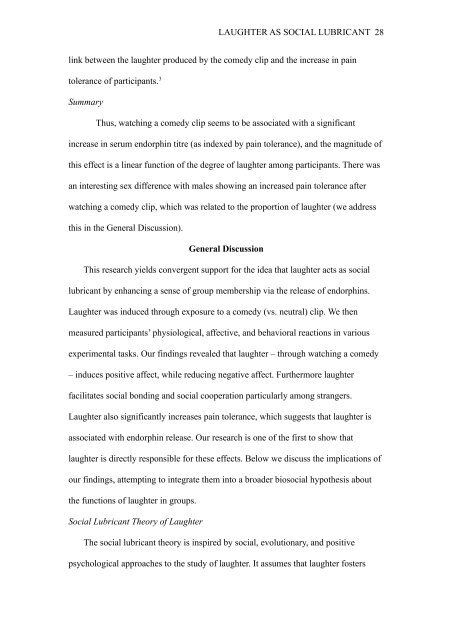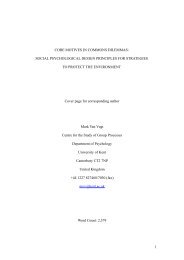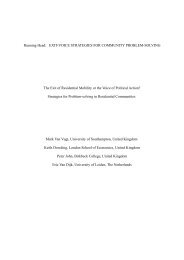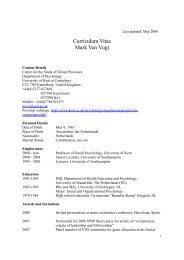Laughter as social lubricant - Mark van Vugt
Laughter as social lubricant - Mark van Vugt
Laughter as social lubricant - Mark van Vugt
Create successful ePaper yourself
Turn your PDF publications into a flip-book with our unique Google optimized e-Paper software.
LAUGHTER AS SOCIAL LUBRICANT 28<br />
link between the laughter produced by the comedy clip and the incre<strong>as</strong>e in pain<br />
tolerance of participants. 3<br />
Summary<br />
Thus, watching a comedy clip seems to be <strong>as</strong>sociated with a significant<br />
incre<strong>as</strong>e in serum endorphin titre (<strong>as</strong> indexed by pain tolerance), and the magnitude of<br />
this effect is a linear function of the degree of laughter among participants. There w<strong>as</strong><br />
an interesting sex difference with males showing an incre<strong>as</strong>ed pain tolerance after<br />
watching a comedy clip, which w<strong>as</strong> related to the proportion of laughter (we address<br />
this in the General Discussion).<br />
General Discussion<br />
This research yields convergent support for the idea that laughter acts <strong>as</strong> <strong>social</strong><br />
<strong>lubricant</strong> by enhancing a sense of group membership via the rele<strong>as</strong>e of endorphins.<br />
<strong>Laughter</strong> w<strong>as</strong> induced through exposure to a comedy (vs. neutral) clip. We then<br />
me<strong>as</strong>ured participants’ physiological, affective, and behavioral reactions in various<br />
experimental t<strong>as</strong>ks. Our findings revealed that laughter – through watching a comedy<br />
– induces positive affect, while reducing negative affect. Furthermore laughter<br />
facilitates <strong>social</strong> bonding and <strong>social</strong> cooperation particularly among strangers.<br />
<strong>Laughter</strong> also significantly incre<strong>as</strong>es pain tolerance, which suggests that laughter is<br />
<strong>as</strong>sociated with endorphin rele<strong>as</strong>e. Our research is one of the first to show that<br />
laughter is directly responsible for these effects. Below we discuss the implications of<br />
our findings, attempting to integrate them into a broader bio<strong>social</strong> hypothesis about<br />
the functions of laughter in groups.<br />
Social Lubricant Theory of <strong>Laughter</strong><br />
The <strong>social</strong> <strong>lubricant</strong> theory is inspired by <strong>social</strong>, evolutionary, and positive<br />
psychological approaches to the study of laughter. It <strong>as</strong>sumes that laughter fosters



![environmental conservation [sustainability] as social ... - Mark van Vugt](https://img.yumpu.com/25510219/1/184x260/environmental-conservation-sustainability-as-social-mark-van-vugt.jpg?quality=85)




